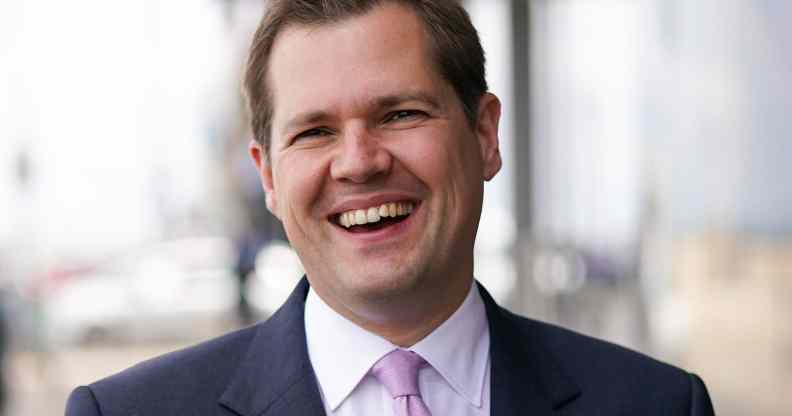Tory minister Robert Jenrick ‘fully supports’ electing Britain’s first openly trans MP

Robert Jenrick MP, Secretary of State for Housing, Communities and Local Government. (Ian Forsyth/Getty Images)
Tory minister Robert Jenrick is “fully supportive” of electing an openly transgender politician into parliament.
Jenrick told Times Radio that he backs calls by the new special envoy on LGBT+ rights, Lord Herbert, for the UK to elect its first openly trans MP. Jenrick said he wants parliament to be “as diverse as possible to represent the country in its fullest sense”.
“I’m fully supportive of having people of all backgrounds in parliament,” Jenrick said.
“We have made a lot of progress in recent years with respect to LGBTQ members of parliament, but Nick Herbert is right to say there isn’t anybody who is trans within parliament at the moment and perhaps that will change in the future.”
He added: “He’s right to point out that there are trans members of other parliaments, elsewhere in the world.”
The UK has never had an openly trans or non-binary MP. In the 2019 election, four trans women and six non-binary people stood for election across the Greens, Lib Dems and Labour – a record number of trans candidates, though few were in winnable seats and more than half lost their deposits.
Belgium, the US, São Paulo, Ecuador, Thailand, Venezuela, Taiwan and France are among the countries with out and proud trans politicians.
Robert Jenrick agrees with Liz Truss: ‘Women have vaginas’
The Conservative housing secretary was speaking on 4 July on Times Radio, presented by Tom Newton Dunn, and was pressed on whether you need to have a vagina to be a woman.
Newton Dunn asked Robert Jenrick about “the whole issue of trans self-identification”, which he called a “hotly disputed topic”.
“Liz Truss… said quite firmly recently that women have vaginas”, Newton Dunn said. “Do you think you need a vagina to be a woman?”
Do you need to have a vagina to be a woman? Yes, Robert Jenrick suggests to T&G: "I think there is a matter of biology of course of what is a woman. I absolutely agree with Liz Truss if that's the point that she's made in the past"@TimesRadio
— Tom Newton Dunn (@tnewtondunn) July 4, 2021
Robert Jenrick replied: “Well, it’s a complicated topic. But I think the point about self-identification is really about the impact on others. I think you have to be extremely careful when you’re talking about trans people who are self-identifying going into women’s prisons, for example, within school settings, in public toilets.”
There are 130 trans women in the UK prison system and 119 of them are housed in men’s prisons, according to a 2019 Ministry of Justice report. Eleven are held in women’s prisons.
Figures released in 2020 show that out of 122 reported sexual assaults in women’s prisons in the past decade, five were perpetrated by trans inmates. Meanwhile, the MOJ said that 11 trans women prisoners were assaulted in prisons in England and Wales last year.
Jenrick added: “In those settings I do think we have to tread carefully, because many women, in particular, feel that this is a matter for their own personal protection and privacy, and we need to support and ensure that they feel comfortable in those settings.”
Pressed by Newton Dunn on his question of whether you need the “classic physical attributes of a woman, female genitalia, to be a woman” Jenrick said: “I think there’s a matter of biology, of course, of what is a woman.”
He continued: “Absolutely I agree with Liz Truss if that’s the point she’s made in the past. Of course we want to ensure that those people who are trans can live their lives comfortably. I want everyone to live in their life the way they want to, and be happy and to find love wherever they can do.”
Regarding self-identification, Jenrick added: “One does have to be aware of the impact on other people, and that means we have to be particularly sensitive in those settings that we as a government are responsible for, like schools, hospitals and prisons. One has to tread carefully and think through all the consequences of this for other members of society.”
Jenrick’s department is currently conducting a review of public toilet provision in the UK, which has been branded “alienating and discriminating” against trans people.

